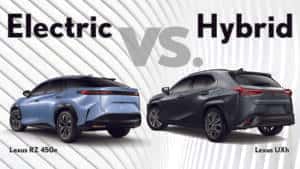The automotive world is rapidly evolving, with electric vehicles (EVs) and hybrid vehicles gaining popularity as alternatives to traditional gasoline-powered cars. If you’re considering making the switch, it’s important to understand the key differences between EVs and hybrids.
What is an Electric Vehicle (EV)?
An electric vehicle, or EV, is powered entirely by electricity. EVs have one or more electric motors that are powered by a battery pack, which needs to be recharged by plugging into an electric power source. Some key features of EVs include:
- Zero Emissions: EVs produce no tailpipe emissions, making them an environmentally friendly option.
- High Efficiency: Electric motors are highly efficient, often converting over 85% of the electrical energy from the battery into mechanical energy.
- Quiet Operation: EVs are known for their quiet and smooth ride since electric motors produce less noise and vibration compared to internal combustion engines.
- Lower Operating Costs: EVs have fewer moving parts than gasoline vehicles, leading to lower maintenance costs. Additionally, electricity is generally cheaper than gasoline, reducing the cost per mile.
What is a Hybrid Vehicle?
A hybrid vehicle combines a traditional internal combustion engine with an electric motor and battery. There are several types of hybrids, but the two most common are:
- Parallel Hybrid: In a parallel hybrid, the electric motor and gasoline engine can work together or separately to power the vehicle. The battery is recharged through regenerative braking and the internal combustion engine.
- Series Hybrid (Extended-Range EV): In a series hybrid, the gasoline engine acts as a generator to produce electricity for the electric motor, which is the sole source of propulsion for the vehicle.
Some key features of hybrid vehicles include:
- Improved Fuel Efficiency: By combining an electric motor with a gasoline engine, hybrids can achieve better fuel efficiency than traditional vehicles.
- Lower Emissions: While hybrids still produce emissions, they are generally lower than those from conventional gasoline vehicles.
- Versatility: Hybrids can use the gasoline engine for longer trips and the electric motor for short distances, providing a balance between efficiency and range.
- Regenerative Braking: This technology captures energy usually lost during braking and uses it to recharge the battery, improving overall efficiency.
Comparing EVs and Hybrids
When deciding between an EV and a hybrid, consider the following factors:
- Environmental Impact: EVs have a clear advantage in terms of reducing emissions, as they produce no tailpipe emissions. Hybrids, while better than conventional vehicles, still rely on gasoline and thus produce some emissions.
- Range and Refueling: Hybrids generally have a longer range than EVs because they can rely on gasoline when the battery is depleted. EVs require access to charging infrastructure, which may be less convenient in some areas. However, advancements in battery technology are continually improving the range of EVs.
- Cost: EVs tend to have higher upfront costs due to the expensive battery packs, but they can save money in the long run through lower operating and maintenance costs. Hybrids are often more affordable upfront and still offer some savings on fuel.
- Driving Experience: EVs offer a unique driving experience with instant torque, smooth acceleration, and quiet operation. Hybrids provide a more familiar experience, blending the benefits of electric power with the reliability of a gasoline engine.
Conclusion
Both EVs and hybrids offer significant benefits over traditional gasoline-powered vehicles. Your choice will depend on your priorities, such as environmental impact, range, cost, and driving experience. As technology continues to advance, both types of vehicles will become even more efficient and accessible, making it an exciting time to consider making the switch to a greener mode of transportation.
